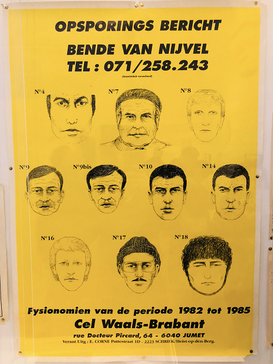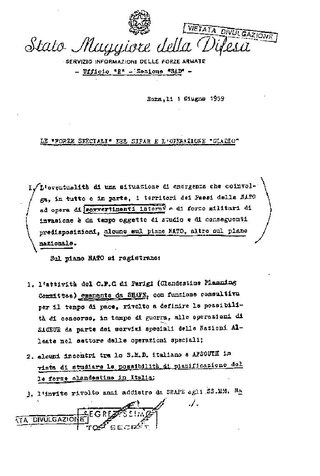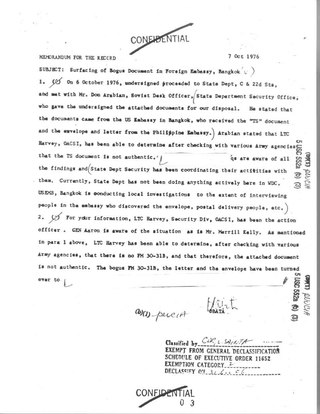
Arms trafficking or gunrunning is the illicit trade of contraband small arms, explosives, and ammunition, which constitutes part of a broad range of illegal activities often associated with transnational criminal organizations. The illegal trade of small arms, unlike other organized crime commodities, is more closely associated with exercising power in communities instead of achieving economic gain. Scholars estimate illegal arms transactions amount to over US$1 billion annually.

The Brabant killers are a group of unidentified criminals responsible for a series of violent attacks that mainly occurred in the Belgian province of Brabant between 1982 and 1985.
A royal commission is a major ad-hoc formal public inquiry into a defined issue in some monarchies. They have been held in the United Kingdom, Australia, Canada, New Zealand, Norway, Malaysia, Mauritius and Saudi Arabia. In republics an equivalent entity may be termed a commission of inquiry.

The Senate is one of the two chambers of the bicameral Federal Parliament of Belgium, the other being the Chamber of Representatives. It is considered to be the "upper house" of the Federal Parliament.

Operation Gladio was the codename for clandestine "stay-behind" operations of armed resistance that were organized by the Western Union (WU), and subsequently by NATO and by the CIA, in collaboration with several European intelligence agencies during the Cold War. Although Gladio specifically refers to the Italian branch of the NATO stay-behind organizations, Operation Gladio is used as an informal name for all of them. Stay-behind operations were prepared in many NATO member countries, and in some neutral countries.
The Australian Law Reform Commission is an Australian independent statutory body established to conduct reviews into the law of Australia. The reviews, also called inquiries or references, are referred to the ALRC by the Attorney-General for Australia. Based on its research and consultations throughout an inquiry, the ALRC makes recommendations to government so that government can make informed decisions about law reform.

The Parliament of Romania is the national bicameral legislature of Romania, consisting of the Chamber of Deputies and the Senate. It meets at the Palace of the Parliament in Bucharest, the capital.

The Senate of Kazakhstan is the upper house of two chambers in Kazakhstan's legislature, known as the Parliament (Parlamenti). The Senate is composed of elected members: two from each region and two from three municipalities which are Almaty, Astana, and Shymkent.

Felice Casson is an Italian magistrate and politician, who discovered the existence of Operation Gladio, a "stay-behind" NATO anti-communist army during the Cold War, while investigating the Peteano bombing in 1972, for which two neo-fascists were convicted; the explosives used in the attack supposedly came from a NATO arms cache. 622 Gladio members, including two people who served as prime minister and president, were exposed in the course of the investigation.
The Belgian stay-behind network, colloquially called "Gladio", was a secret mixed civilian and military unit, trained to form a resistance movement in the event of a Soviet invasion and part of a network of similar organizations in North Atlantic Treaty Organization states. It functioned from at least 1951 until 1990, when the Belgian branch was promptly and officially dissolved after its existence became publicly known following revelations concerning the Italian branch of the stay-behind network.

The US Army Field Manual 30-31B, dubbed the Westmoreland Field Manual, purportedly outlined a strategy called the "strategy of tension," wherein violent attacks are orchestrated and blamed on left-wing groups to justify government action. However, most scholars believe it to be a Cold War-era hoax conducted by Soviet intelligence services.
The Antimafia Commission is a bicameral commission of the Italian Parliament, composed of members from the Chamber of Deputies and the Senate of the Republic. The first commission, formed in 1963, was established as a body of inquiry tasked with investigating the "phenomenon of the [Sicilian] Mafia". Subsequent commissions expanded their scope to investigate all "organized crime of the Mafia type", which included other major criminal organizations in Italy, such as the Camorra, the 'Ndrangheta, and the Sacra Corona Unita.
Projekt-26, best known as P-26, was a stay-behind army in Switzerland charged with countering a possible invasion of the country. The existence of P-26 as secret intelligence agencies dissimulated in the military intelligence agency (UNA) was revealed in November 1990 by the PUK EMD Parliamentary Commission headed by senator Carlo Schmid. The commission, whose initial aim was to investigate the alleged presence of secret files on citizens constituted in the Swiss Ministry of Defence, was created in March 1990 in the wake of the Fichenaffäre or Secret Files Scandal, during which it had been discovered that the federal police, BUPO, had maintained files on 900,000 persons.
Albert Raes was a Belgian magistrate and was head of the Belgian Security Services from 1977 until 1990.

United Nations Security Council resolution 1053, adopted unanimously on 23 April 1996, after recalling all previous resolutions on Rwanda, particularly resolutions 918 (1994), 997 (1995), 1011 (1995) and 1013 (1995), the Council reviewed the findings of the Commission of Inquiry concerning violations of the arms embargo against former Rwandan government forces.

United Nations Security Council resolution 1161, adopted unanimously on 9 April 1998, after recalling all previous resolutions on Rwanda, particularly resolutions 918 (1994), 997 (1995), 1011 (1995), 1013 (1995) and 1053 (1996), the Council reactivated the Commission of Inquiry concerning violations of the arms embargo against former Rwandan government forces.

The history of Czech civilian firearms possession extends over 600 years back when the Czech lands became the center of firearms development, both as regards their technical aspects as well as tactical use.
A Parliamentary Inquiry Committee is an investigation committee of the legislative branch, which transforms the parliamentary house itself into a committee to hear testimonies and gather information directly. At the municipal level, its correct name is Special Inquiry Committee.










